Introducción
Analyze your business needs
What is your outdoor led screen application?
What kind of display screen effect is better for your led screen?
What brightness is the most suitable for your led screen?
What kind of led cabinet is the most suitable for outdoor advertising led display?
How to choose the suitable maintenance method according to the installation position?
How to achieve real-time monitoring of the led screen?
Outdoor LED screen-related cases
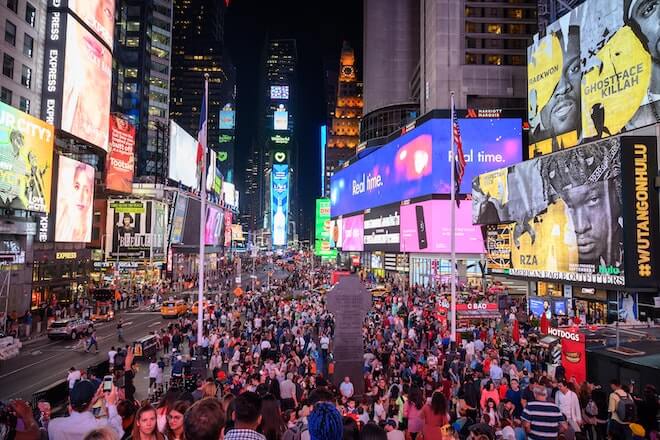
Elegir un pantalla LED al aire libre suitable for you is not easy.
In addition to the initial purchase investment, you also need to know how to enhance a good image for your company and what kind of marketing strategy to attract more advertisers.
Of course, a high-quality LED display can make your work more convincing.
Since 2017, BIBILED has consulted thousands of people, providing professional LED display solutions according to customers’ budgets, needs, and characteristics.
The following articles are the latest suggestions for the latest LED display in 2023; I hope to give you a direction to choose the most suitable advertising LED display for you.
1. Analyze your business needs
Before buying an LED display, you need to ask yourself a few questions to analyze what goals you need to achieve when installing an LED display.
What do you want from an LED display? Product promotion? Improve corporate image? Increase income? Cultural propaganda? Sporting events? Safety instructions?
Is this method of content promotion acceptable to your user base, buyers, or consumers?
Does your ideal LED display meet your budget?
How do you measure that installing a LED display is better than other advertising
When do you plan to start achieving your goals?
Where are you going to buy an LED display?
Do you need an installation company?
Your display needs more video or more text and pictures.
- …
The more specific your answer is, the more you will know what kind of LED screen you need, the price of the LED screen, its main function and size, etc., and the clarity you will be in your purchasing thoughts.
2. What is your outdoor led screen application?
For your outdoor installation scenarios, the installation methods are also different; there are 6 commonly used outdoor installation methods:
1) Sport arena
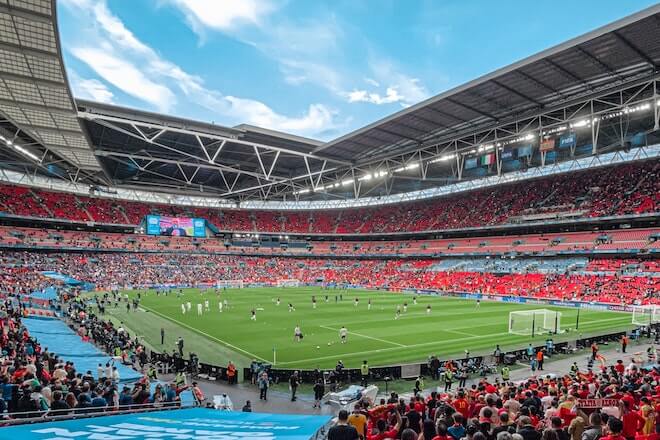
If you put it on an outdoor playground event, it is used to display game scores, video playback, advertisements, etc., and a multi-function display.
Requerimientos de instalación:
Strong and rigid roofs, ceilings
The LED screen needs to have enough space for post-maintenance and maintenance.
2) Rooftop

If you need oversized display advertising and do not need additional land, roof installation can achieve better visibility and, thus, a longer viewing distance.
Requerimientos de instalación:
Solid roof structure
Roofs are properly waterproofed to increase environmental resistance.
3) Overhead screen
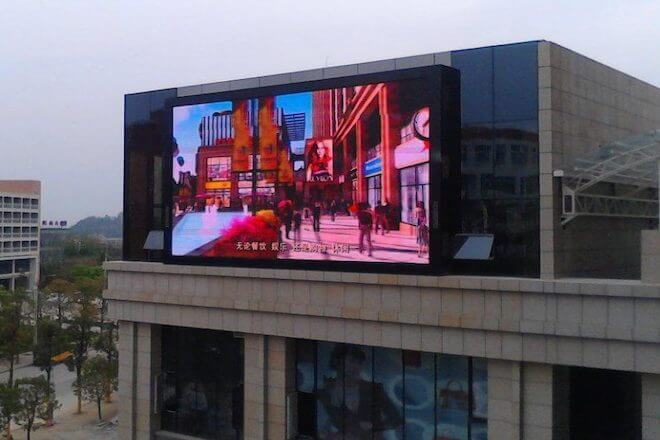
3) If it needs to be placed on the side of the road or across the street, then the LED display (overhead screen) on the independent steel structure is installed, but it needs the permission of the local government, and you need to consult the local area for details.
Requerimientos de instalación:
Requires a separate steel frame structure or bridge structure
Ladders or stairs are available mainly to maintain the LED display in the later stage.
4) Single-pole or double-pole
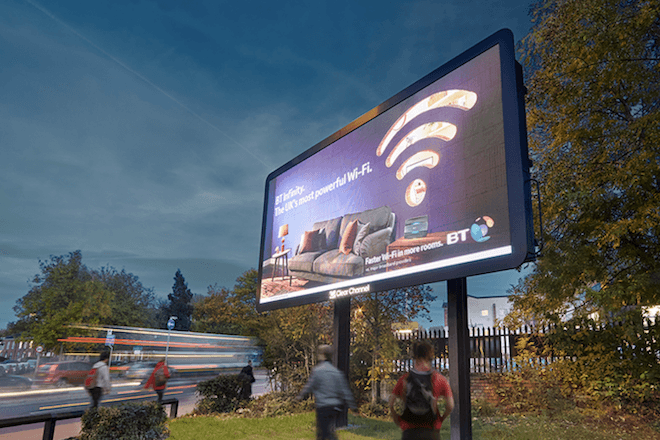
Single-pole or double-pole installations are often used, and one or two poles support the LED display above the ground. Because this installation requires concrete as a foundation, seat engineers need to evaluate soil conditions, wind loads, and Billboard height.
Requerimientos de instalación:
Large concrete foundation with good soil conditions
screen size requirements
Location
There will be no disturbance or obstruction to public transport and buildings.
5) Wall mounted
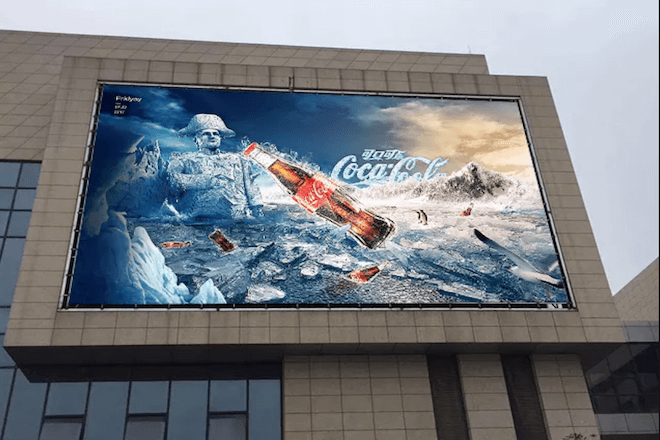
Wall-mounted LED screens are a regular sight in construction. It is one of the most popular installations for digital billboards and outdoor advertising.
Requerimientos de instalación:
Solid & rigid wall structure
750mm to 900mm maintenance platform (only outdoor screen installation)
6) Wall embedded
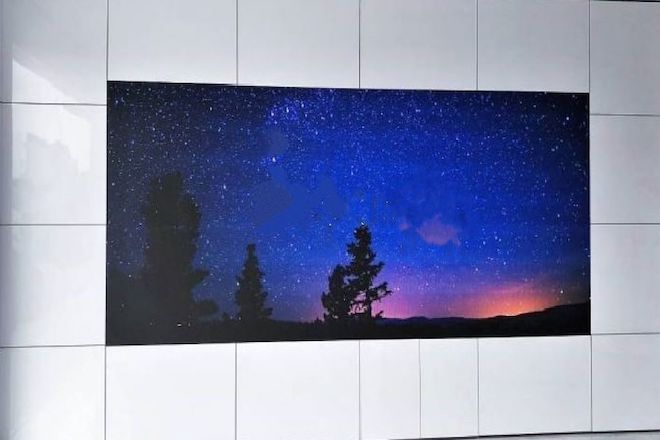
Both indoor and outdoor applications are appropriate for wall-embedded installation; the LED screen is built into the wall so that the entire aesthetic will be consistent. For aesthetic reasons, installation is a fantastic choice.
However, developing and planning the LED screen for the wall-integrated installation calls for greater caution. The depth of the wall must be sufficient for the LED screen and the steel frame that supports it, according to the engineer. The mounted LED screen’s surface must align with the wall’s surface.
Requerimientos de instalación:
Strong & rigid wall structure
Sufficient depth for the steel frame holding the LED display as well
Heat-dissipating system with active ventilation (for outdoor installation)
3. What kind of display screen effect is better for your led screen?
If you want an LED display with rich colors and high-definition display, you need to understand these words, which will be of great help to your next purchase:
Distancia de visualización
Tamaño de píxel
Frecuencia de actualización
resolución
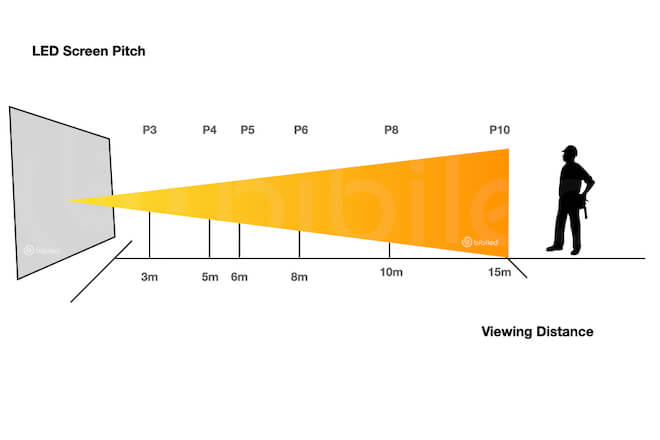
As the name implies, it refers to the viewing distance between the viewer and the LED display.
If you don’t consider the viewing distance, the passing pedestrians can’t see the display content, or the picture quality is very rough, and the unique display effect of the LED display itself is completely meaningless.
You can judge the viewing distance of the outdoor LED display according to the following reference table:
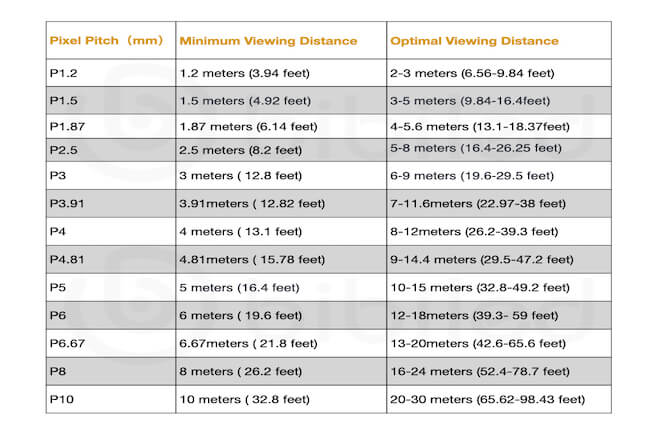
The pixel point refers to the distance between the light-emitting source point and the point, usually in millimeters, which is generally called “P” by people in the industry.
So how to choose the correct pixel spacing?
Generally speaking, small screens with small pixel pitches use small pixels, and outdoor large LED displays use larger pixels, usually installed at a distance of more than 5 meters P8 and P10 are the choices of many people.
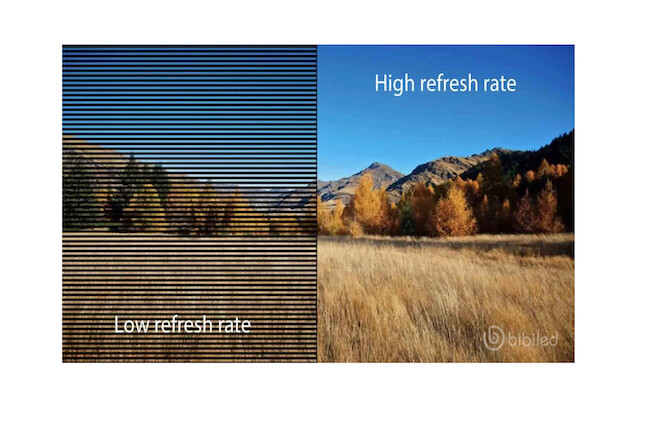
The refresh rate is the speed at which the image is quickly updated on the LED display, the number of times the image appears on the screen per second, usually expressed in “Hz”, which we cannot sense with the naked eye, but as long as there is a picture displayed, it will always exist.
The difference between a high and a low refresh rate is that when you pick up the mobile phone or camera in your hand to shoot the content displayed by the LED, the captured picture is a constantly fluctuating black bar or flickering a low refresh rate. In contrast, a high refresh rate does not.
However, do you have to have a very high refresh rate for good visuals?
The answer is not necessarily. Generally speaking, if the refresh rate reaches 80Hz or more, the screen will not have the problem of beating black stripes and flickering, and the eyes will not be easily fatigued.
Our ordinary LED display has a refresh rate of 1920Hz, which can meet normal needs, but some installation scenarios require high refresh, such as radio and television stations, military surveillance, concerts, stage performances, etc., because audiences want to use mobile phones or video equipment to take pictures.
4) Resolución
Have you watched a youtube video? There is a “quality setting” in the lower right corner of the viewing screen, which contains: … 480p-720p-1080p-2K-4K… (the better the picture quality from left to right); this is the resolution, then what kind of resolution is suitable for an LED display screen?
For better quality and full HD experience, we recommend you choose at least 1080 resolution.
Of course, if you are a TV broadcast or XR stage, it is best to provide a higher resolution display, such as 2K or 4K.
4. What brightness is the most suitable for your led screen?
As an outdoor advertising display, brillo is very important.
If your LED screen is too bright, it will not only give the viewer a dazzling and bad experience but also waste electricity and shorten the life of the LED screen.
If your LED screen is poorly lit, pedestrians won’t be able to see what’s displayed, especially under the scorching sun on a sunny day.
So what kind of brightness is most suitable for outdoor LED displays?
4000-5000cd/m²: The most common brightness of outdoor LED screens is generally used on highways, walls, etc.
≥5,000cd/m²: Suitable for outdoor LED displays installed in outdoor high-light environments, such as countries with high temperatures all year round.
5. What kind of led cabinet is the most suitable for outdoor advertising led display?
1) IP rating:
Since the LED display installed outdoors will withstand the test of different weather in four seasons, it needs to have “armor” to protect the internal electronic equipment and meet the necessary conditions such as waterproof, dustproof, and antifreeze.
So, what level of protection complies with the standard?
How to choose the protection level of the LED display box?
You can understand this rule: the higher the protection level value, the stronger its defense capability.
Usually, outdoor LED cabinets use IP65, which can cope with basic environmental changes, but if you are in an environment with heavy rains, typhoons, and tsunamis all year round, it is best to use IP68 for your outdoor LED cabinets.
2) Internal temperature regulation
This is also very important.
The LED display will generate heat when it is working; if the external ambient temperature is 38 degrees Celsius, the temperature inside the LED display is expected to reach above 55 degrees Celsius. At this time, the internal temperature of the LED display cannot be adjusted. The circuit board inside will not work and even catch fire.
Then when you purchase an LED display, you can check whether the LED cabinet has a cooling system; several small fans are on the back of the box to ensure that the display temperature is kept between -10-40 degrees Celsius. If you are in a relatively hot environment, consider the need to install an air conditioner.
3) Lightning protection
Whether there is a ground wire in the LED cabinet, and at the same time, install lightning arresters on the LED display and buildings to avoid the attack of strong electricity and strong magnetism generated by lightning, and burn out the internal electronic integrator.
6. How to choose the suitable maintenance method according to the installation position?
A suitable led screen maintenance method is conducive to later maintenance and repair. Outdoor LED displays are mainly divided into 2 maintenance methods: front and rear, so how should we choose?
1) Front maintenance
Suppose your LED display is installed in a mosaic or splicing wall installation environment, or there is no extra land space behind the LED display. In that case, you can choose front maintenance, which saves materials, is easy to install, and is lightweight.
2) Rear maintenance
If you have a single-post or double-post installation or an LED display installed on the side of the road or the roof, it is best to maintain it after selection, and a maintenance channel can be designed to allow maintenance personnel to perform efficient and fast maintenance and repair from the back of the LED display.
7. How to achieve real-time monitoring of the led screen?
How to monitor the LED display in real-time?
Customers who think about this problem generally worry about 2 main issues:
If your LED display needs to repair, I’m far away and can’t be the first to know.
What if someone wants to steal your LED display?
If you want to monitor the LED display in real time, you first need to know what LED control system you use to control the screen.
There are usually two ways to control the operation and display of LED billboards: synchronous and asynchronous systems. T
The 2 control methods are different, and the real-time monitoring of the screen will also be different.
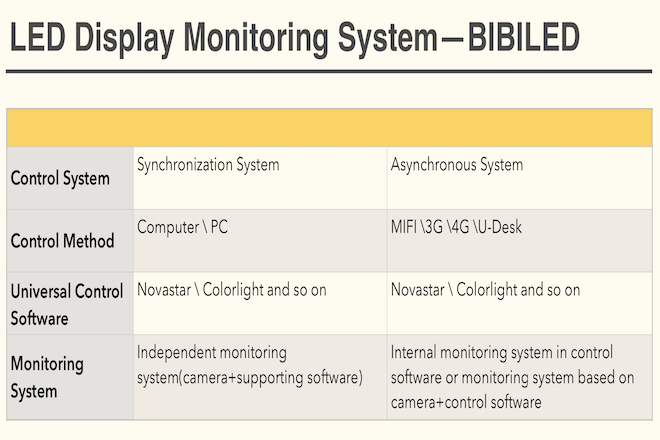
8. Outdoor LED screen-related cases
Conclusión
The above 7 points are the issues that need attention when purchasing LED displays, which can avoid most of the purchasing mistakes.
If you have questions about buying LED displays, you can leave a message below or Contáctenos, and we will answer you in time.
